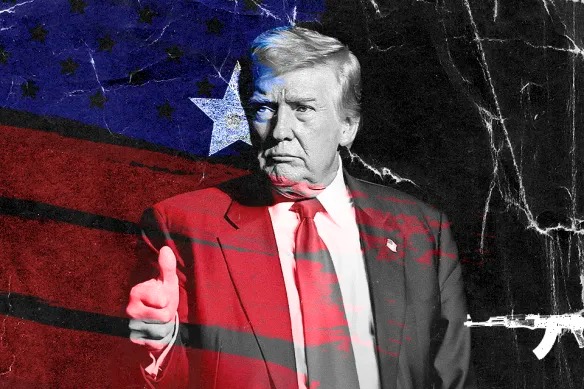Department of Strategic Security and Military Research and Studies 16-09-2024
In just five words, a spokesperson for the U.S. Secret Service captured the gravity of the situation at the Trump International Golf Course in West Palm Beach, Florida: “We live in dangerous times.”
The statement came during a Sunday afternoon press conference, only hours after a person was spotted near the golf course carrying what appeared to be an AK-47-style semi-automatic rifle. The individual was just a few hundred yards from Donald Trump, who was on the course at the time.
The FBI is investigating this event as the second assassination attempt on the former president in as many months. Images released by authorities seem to show a makeshift sniper’s nest, raising serious security concerns over how someone was able to get so close to Trump.
At the briefing, law enforcement officials emphasized how close Trump came to being targeted, just weeks after being grazed by a bullet at a rally in Butler County, Pennsylvania, on July 13. West Palm Beach Sheriff Ric Bradshaw, when asked how far the suspect was from Trump, said: “Probably between 300 and 500 yards – but with a rifle and scope like that, that’s not a lot of distance.”
The emergency began at approximately 1:30 p.m. on Sunday, when the Secret Service reported gunfire. At that moment, Trump was playing golf with his friend, Republican donor Steve Witkoff, between the 5th and 6th holes of the 18-hole course.
Bradshaw explained that the area was filled with thick foliage, providing cover for the alleged gunman, who positioned himself on the edge of the course. In addition to the AK-47-style rifle and a scope, the suspect was reportedly carrying two backpacks and a GoPro camera, suggesting he intended to document the incident.
In the aftermath, two contrasting narratives emerged.
The first highlighted the vulnerability of Trump, who, despite enhanced security following the Pennsylvania shooting, was still exposed to potential threats. Critics questioned how an armed individual could infiltrate the golf course and remain undetected in the surrounding bushes. Bradshaw noted that if Trump were the sitting president, he would never have been allowed to play golf in such an exposed location. However, as a former president, the Secret Service’s protective measures are limited.
The second narrative was more favorable, focusing on the Secret Service’s quick response. Unlike the Butler County incident, which led to criticism and the resignation of Secret Service Director Kimberly Cheatle, this time the agency acted swiftly. A forward guard agent, stationed ahead of Trump to assess threats, noticed the rifle barrel among the dense greenery and immediately fired four to six rounds, engaging the suspect.
Bradshaw commended the agent’s actions, calling them “fantastic.” The suspect, after being shot at, dropped his weapon and fled, jumping into a black Nissan positioned for a quick escape. A bystander, observing the suspect’s flight, managed to photograph the car and its license plate.
Florida’s surveillance system played a key role in tracking the suspect, whose vehicle was quickly identified through license plate readers. Within minutes, authorities located the suspect on the I-95 highway and apprehended him at gunpoint. Martin County Sheriff William Snyder noted that the suspect was calm and showed little emotion when arrested.
The seamless coordination between federal and local law enforcement likely averted a disaster, yet questions remain about how Trump could have been placed in such a vulnerable position. In the wake of two assassination attempts within a short period, concerns about the former president’s safety and the broader security situation in the U.S. are likely to persist.
A vigilant Secret Service agent may have prevented a national tragedy, but the question remains: Is this level of security enough?
“The threat level is high,” the Secret Service spokesperson reiterated. “We live in dangerous times.”

